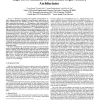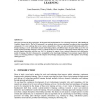723 search results - page 99 / 145 » Heterogeneous behavioral hierarchy for system level designs |
CHI
2007
ACM
14 years 8 months ago
2007
ACM
Domestic ubiquitous computing systems often rely on inferences about activities in the home, but the open-ended, dynamic and heterogeneous nature of the home poses serious problem...
ICCAD
2002
IEEE
14 years 4 months ago
2002
IEEE
Abstract— With the increasing cost of global communication onchip, high-performance designs for data-intensive applications require architectures that distribute hardware resourc...
IADIS
2004
13 years 9 months ago
2004
This paper presents the design principles, development and implementation of an e-learning framework, called Intelligent Cognitive Agents (InCA). The InCA framework is an ontology...
EUROPAR
2004
Springer
14 years 1 months ago
2004
Springer
The interesting properties of P2P systems (high availability despite peer volatility, support for heterogeneous architectures, high scalability, etc.) make them attractive for dist...
IROS
2007
IEEE
14 years 1 months ago
2007
IEEE
— Any system that has the capability to diagnose and recover from faults is considered to be a fault-tolerant system. Additionally, the quality of the incorporated fault-toleranc...


